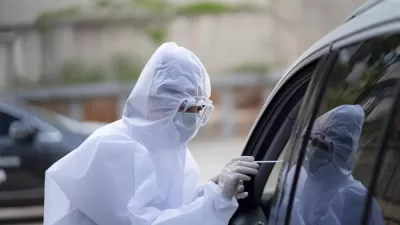Taking advantage of low borrowing costs, Mayor Michael Bloomberg announced this week that New York City will spend up to $1 billion on “critical” infrastructure, including bridges, roads, schools and libraries over the next 20 months.
The projects the city has identified for the $1 billion program, including the "removal of toxic PCBs and repairs to about 100 school
buildings, resurfacing of about 300 additional lane-miles of
roads, street construction, bridge repair and waterfront
improvements," were originally part of a four-year capital plan, reports Henry Goldman.
Under the program announced this week, "the city will borrow the money sooner
to take advantage of historically low interest rates, saving
taxpayers more than $200 million in debt service over the term
of the bonds and creating 8,000 jobs, Bloomberg said at a City
Hall news conference."
"Aside from saving the city money and improving its
infrastructure, the primary benefit of the program would be to
create jobs," said Bloomberg, city Comptroller John Liu, and City Council Speaker Christine Quinn.
FULL STORY: NYC to Accelerate $1 Billion in Capital Expenditures, Mayor Says

Planetizen Federal Action Tracker
A weekly monitor of how Trump’s orders and actions are impacting planners and planning in America.

Maui's Vacation Rental Debate Turns Ugly
Verbal attacks, misinformation campaigns and fistfights plague a high-stakes debate to convert thousands of vacation rentals into long-term housing.

Restaurant Patios Were a Pandemic Win — Why Were They so Hard to Keep?
Social distancing requirements and changes in travel patterns prompted cities to pilot new uses for street and sidewalk space. Then it got complicated.

In California Battle of Housing vs. Environment, Housing Just Won
A new state law significantly limits the power of CEQA, an environmental review law that served as a powerful tool for blocking new development.

Boulder Eliminates Parking Minimums Citywide
Officials estimate the cost of building a single underground parking space at up to $100,000.

Orange County, Florida Adopts Largest US “Sprawl Repair” Code
The ‘Orange Code’ seeks to rectify decades of sprawl-inducing, car-oriented development.
Urban Design for Planners 1: Software Tools
This six-course series explores essential urban design concepts using open source software and equips planners with the tools they need to participate fully in the urban design process.
Planning for Universal Design
Learn the tools for implementing Universal Design in planning regulations.
Heyer Gruel & Associates PA
JM Goldson LLC
Custer County Colorado
City of Camden Redevelopment Agency
City of Astoria
Transportation Research & Education Center (TREC) at Portland State University
Jefferson Parish Government
Camden Redevelopment Agency
City of Claremont



























